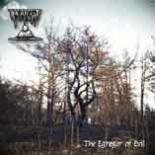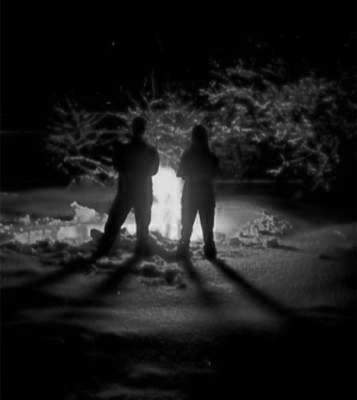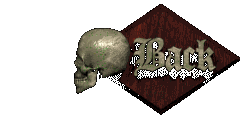
'The Egregor of Evil'
(Self released CDr in 2002 and re-released by Oskorei
in 2004)

MARK: 74/100
The
second CD for this cult band from Moscow's suburbs has been re-released
this year by the Russian indie label Oskorei and is a bit different
from the debut as it contains more mid-tempi, gloomier riffs and a few
smart experimental solutions.
The recording and mixing tend to hide high frequencies and the snare
drum unfortunately, and is probably the weak aspect of this full-length.
"Barbaric March" is the instrumental opener, halfway
between Bathory and Falkenbach, followed by "Casemate # 802",
showing a male/female vocal duet, absent in the debut and in the following
CD; moreover, the male vocals are different from the ones on "Wreaking
Overrun" and Occult Stellarghost screams really rough here.
The greatly-titled "Winds of Eternal Grief" begins
in a groovy manner and then it grows with a couple of Thrash passages;
the following Black is less oppressive and somewhat oneiric. The title
track contains an initial riff somehow Emperoresque. The two final riffs
(one undistorted and another distorted) are surely quite beautiful,
while the rest is furious Black metal.
"The Sufferers" is my favourite piece, probably because
the vocals are even more distinctly devoted to Darkthrone ("Total
Death" and "Panzerfaust" in particular, between
Dead and Nocturno Culto); it's also worth stressing out the role of
the keyboards, hieratic yet never invading.
"Sozvezdiya Lyry i Orla" (Constellations of Lyra and
Eagle) will make you dream with eyes wide open, first with whispered
vocals and later by funeral or suffusedly ascetic keyboards; it's concluded
by brilliant punishing male vocals.
"Bearer of Knowledge Always Alone" mixes male screams
and clean sing-songing bisexual vocals; also, it includes two longing
guitar solos.
Imperious battle Black metal with croaking vocals and rare melodic keyboards
interventions is "The Trumpet Call", whereas splendid
are the female vocals (poetical, hypnotical or whispered) signing "Pomny
o smerty" (Remember of death); this masterpiece spaces from
Symphonic as far as Folk Black metal and is an invitation to let our
souls fly high like an eagle on its notes!
The next composition, "Dissonant Occult Experience",
dives into the most lugubrious esotericism, enough to be defined 'the
soundtrack of a real sabbatical ceremony', even though it embodies a
very original kind of Black metal as well; this insertion, that sums
a not distorted electric guitar and a distorted one might, make some
of you think of Opera IX.
Finally, the cover of Ludwig Van Beethoven's "Egmont"
(minor version), is mostly dark and royal, nevertheless there are a
few sunny moments as well.
The come-back of Twilight Is Mine can't but witness what good their
debut Cd reserved for us, even if I keep on preferring that, probably
owing to the better recording.
MARKUS GANZHERRLICH - 12/7/04

Contacts:
E-mail: stellarghost@nm.ru
http://twilightismine.narod.ru/Frameseteng.htm
Discography:
-When the Twilight Covers the World (CD, 2001 - re-released in 2005)
-The Egregor of Evil (CD, 2002)
-Wreaking Overrun (CD, 2003 - re-released in 2005)
-...vom Nachtnebel umarmte Wälder (4-way split - 2006)
-Evolution of Degradation (CDr - 2008)
